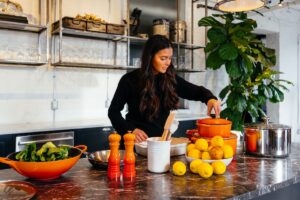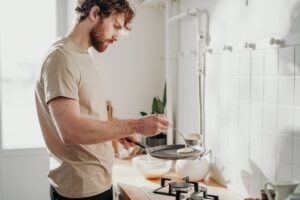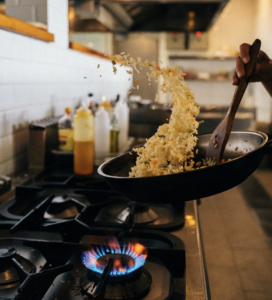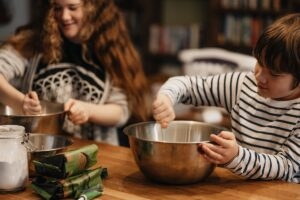features
Mental Health Awareness Week: For many, cooking for one is the ultimate act of self-care
13 May 2022
6m
For some people, the joy of cooking and eating often gets lost in the bustle of the daily grind. You might be a dab hand in the kitchen, but after a long day at work, the thought of throwing a meal together may seem like little more than a chore; the latest thing on a to-do list; a means of sustenance.
But cast your mind back to lockdown, and banana bread mania. Think of a time you were cooking for no other reason than you wanted to – cooking for yourself, and yourself only.
“Whether it’s something you do once in a while or regularly, I think cooking can be the ultimate act of self care,” says clinical psychologist Dr Marianne Trent. “It can be a really mindful activity if you want it to be, because you can mentally hone in on a recipe if it’s a really involved meal that you’re cooking.
“You can focus on textures, sensations, smells. Certainly anything we do that means we’re thinking, focusing and surrounding ourselves in a sensory environment can be really beneficial for your mental health”.

Cooking a meal for one can be the ultimate comfort (Credit: Unsplash)
The mental health benefits of cooking and eating alone
As someone who often finds solace in the kitchen, Dr Marianne’s comments really resonate. When I’m having a bad day, I still haven’t found a better tonic than chucking on a podcast and immersing myself in cooking, whether that’s by following a recipe to the letter or chucking a bunch of random ingredients in a pan.
There’s something freeing about involving myself in a complicated culinary endeavour for no other reason than because I want to, and there’s a pleasure to be derived from constructing a dish like a lego tower, step by step, until it reaches completion.
After all, in an age where anxieties are often triggered by remaining plugged into the world around us – be it through the news, our social media feeds or a never ending chain of work emails – engrossing yourself in a recipe allows you a brief respite from the stresses of everyday life. As, of course, does settling down to eat your creation.
“It’s not about distracting yourself or escaping your problems, which people shouldn’t do,” Dr Marianne, host of The Aspiring Psychologist Podcast, explains. “But it’s about becoming momentarily absorbed in the task at hand, and doing something for your own satisfaction [and nourishment].
“For some people, not only is food preparation an activity in itself to be enjoyed, but [taking the time to cook for themselves] is a novelty.”
These days, cooking can be hard for many people, because of lack of free time, fuel prices and the cost of living, but Dr Marianne adds: “even batch cooking one meal a week and saving the leftovers, or preparing yourself a salad and taking the time to eat it and appreciate it is ultimately investing in you and you alone”.

Sometimes cooking can act as a respite from the world (Credit: Pexels)
Cooking as a means of therapy
This self care element is the very reason that several therapists and social workers are keen to harness cookery as a therapy tool.
Whilst art, drama and music therapy have long been accepted by the scientific community as creative outlets with long-term benefits for people’s mental health, until recently, cooking has rarely had a lookin.
But if you think about it, in the same way the former are described as aiding self expression, self awareness, and self esteem, cooking offers some people many of the same benefits. It can be tactile, expressive and to many, freeing, much in the same way that painting a picture can be to other individuals.
In the States, Professor Kocet, from the Chicago School of Professional Psychology, is seeking to highlight this. The expert claims that whilst some people avoid cooking because they see it as a stressful activity, cooking for themselves (rather than a dinner party, or a big group of people) alleviates pressure, and allows them to enjoy food, and its preparation, in a whole new way.
“Cooking can centre people, offering the emotional grounding of a task and a sense of accomplishment,” he tells Eating Well.
He discovered this himself after attending cooking classes, and subsequently founded the very first specialist course in cooking therapy in 2014. Most recently working with those struggling during the pandemic, he also runs therapy classes which encourage people to cook dishes that are sentimental to them, in order to process feelings of grief, fear and anxiety.

Cooking can be a hugely sensory experience (Credit: Pexels)
Because the type of therapy is still in its infancy, it varies depending who is running it.
Kocet is currently offering culinary therapy alongside traditional talking therapy in line with the American counselling Association Code of Ethics, whilst he gathers evidence that the former works as a standalone practice. Meanwhile, here in the UK, there are several facilities forging their own paths.
Here in London, psychotherapist Charlotte Hastings, offers people Kitchen Therapy, giving people talking therapy as they cook. Meanwhile, Monica Worsley is also running cooking therapy sessions from her culinary school Cooking It in Bristol.
She started the therapy classes after discovering the power of cookery when working with children as a social worker for 22 years. Her classes come without accompanying psychological therapy, but she uses the basis of her social care training to inform the way she teaches, and her classes are all about encouraging people to use the kitchen as an outlet in much the same way.
“Having worked with children on the child protection register and young offenders, I realised that all these therapies, like music therapy and art therapy, seemed to really help them,” she tells me. “And I thought, surely cooking will do the same thing?
“So I started cooking with some of the kids and sure enough they came and they found peace and calm in the kitchen.

Monica runs cooking classes in Bristol (Credit: Unsplash)
“I’ve had children in the past that have been really violent, and they were okay when they were cooking. It’s all about concentrating on something and giving them a space to be creative.
“Often, these were families that were really suffering and in poverty and seeing how they reacted to it just proved to me that cooking was therapeutic not just to me but [on a wider scale].”
When life gets you cooking
Many people discovered these benefits of cooking for themselves during the pandemic, when daily life wasn’t an obstacle, and isolation wasn’t a choice, but a necessity.
Premier Foods conducted a survey which found that 73 percent of people enjoyed the opportunity to cook more when in lockdown, as a consequence of restaurants and bars shutting down, and 91 percent said they wanted to continue cooking as much if not more coming out of the pandemic.
Naturally, the pandemic isn’t the only circumstance by which people have discovered an interest in cooking and eating as a more solitary experience.
Francesca Specter, journalist and author of Alonement: How to be alone and absolutely own it, tells me that for her, an enjoyment of preparing and indeed eating food by herself came after a break up in 2018 forced her to adjust her attitude to being on her own.
“As a single person living alone, I didn’t want to go without ever having a nice meal. Food brings joy and I wanted to be able to give it to myself alone as well,” she says.
“I had to overcome something which I call only-me-ism. That’s this belief that, because it’s only me I shouldn’t bother with excellent food. It’s only me so I’m not gonna cook dinner, you know, I’m just gonna make eggs on toast or cereal.
“Now I have got to the point where I appreciate the meditative process of coming in chopping vegetables. I know that’s the one thing that switches me out of work mode and into my being at home routine – but it took some time.
“As much as I like going out and eating with others, one shouldn’t negate the other.
“It’s also empowering to know that you don’t have to be reliant on someone to facilitate your happiness.”
Ultimately, I think Francesca has got it in one. We’re all sometimes guilty of only-me-isms, especially when our mental health isn’t at its best.
But if you only do one thing this Mental Health Week, shake off that feeling and put aside some time and knock yourself up something tasty. I can’t tell you how much it has helped me in the past.



.jpg_dU0O4c?tr=w-2560,f-webp,q-70)